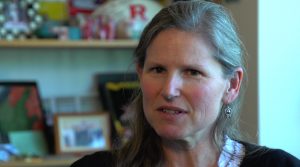The research for a physical oceanographer in the West Antarctic Peninsula (W.A.P.) is a lot more complicated than just simply acknowledging that sea ice is melting. For ocean scientist Sharon Stammerjohn, who – like most of the researchers of the L TER – has been visiting Palmer Station since her graduate studies, the complications of climate change and sea ice have been visible throughout her entire professional lifetime. The West Antarctic winter season has grown 90 days shorter since the beginning of the LTER’s recordings, turning up the heat on physical oceanographers like Sharon who stay readily on their toes to collect satellite data of Antarctic ice mass.
TER – has been visiting Palmer Station since her graduate studies, the complications of climate change and sea ice have been visible throughout her entire professional lifetime. The West Antarctic winter season has grown 90 days shorter since the beginning of the LTER’s recordings, turning up the heat on physical oceanographers like Sharon who stay readily on their toes to collect satellite data of Antarctic ice mass.
In an interview with Film Bureau staff members Steve Holloway and Ryan Joseph at the Institute of Marine and Coastal Sciences, Sharon describes the universal sentiment that oceanographers share while studying the dramatically changing sea ice of the WAP. “It’s shocking,” Sharon says. “It’s hard to comprehend that a system is changing as fast as it’s changing.”
Sharon’s research at the Palmer LTER and the Ross Sea represents a larger effort that physical oceanographers are now making to address climate change in the world’s fastest winter warming place. In working in conjunction with other LTER specialists, including biologists like Oscar Schofield, Sharon not only studies the spatial changes of Antarctic sea ice that an ordinary physical oceanographer would examine, she also monitors temporal changes and its impact on the ecology’s wildlife. “I want to know what time in the spring the sea ice is going away so I can relate that to changes that I see in the biological response,” says Sharon. “To have the opportunity to look at a system with other researchers and to be able to put all the pieces together to see how this system is changing holistically over time is an amazing opportunity.”
As a result, Sharon’s macro-view of Antarctica’s shifting geography is now a vital element in understanding how other scientists view climate change.
Similar to the interdisciplinary efforts between student filmmakers and Antarctic scientists producing “Beyond the Ice,” Sharon’s collaborative efforts with other LTER researchers epitomizes the kind of teamwork necessary to address climate change and to effectively make a difference.



 Follow the
Follow the  Subscribe to the blog RSS feed
Subscribe to the blog RSS feed